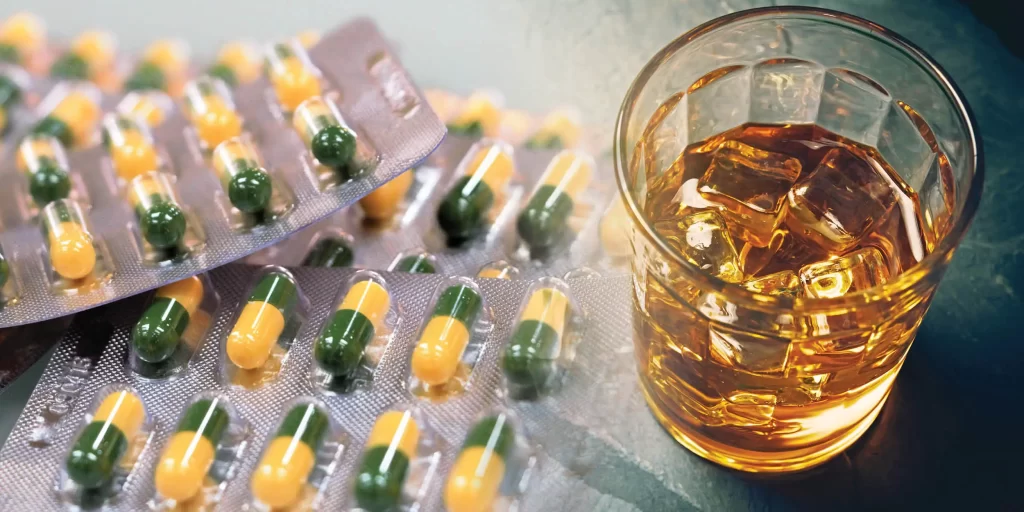Is it safe Mixing Librium and Alcohol?

Librium is a brand name of a drug called chlordiazepoxide, which is a member of the larger benzodiazepine drug class. This drug class is known for its sedative effects and ability to decrease the activity of the central nervous system (CNS). In other words, Librium is a CNS depressant and has shown the ability to treat anxiety and withdrawal symptoms. Many individuals who are prescribed Librium may wonder if they can drink alcohol while taking the drug.
Unfortunately, since Librium is a benzodiazepine, consuming alcohol and Librium together comes with severe warnings, side effects and potential risks. Thus, people who are prescribed Librium or use it recreationally should be aware of the consequences associated with the concurrent use of Librium and alcohol.
Librium for Alcohol Withdrawal
In certain situations, Librium may be prescribed for individuals actively withdrawing from alcohol. Librium for alcohol withdrawal may be beneficial at different stages of alcohol withdrawal. The gold standard medications for treating alcohol withdrawal syndrome are benzodiazepines. In most circumstances, benzodiazepines are not only safe, but can reduce the severity of withdrawal symptoms like shaking and seizures.
There are several different regimens for alcohol withdrawal whereby Librium might be administered. These include:
- Fixed tapering dose regimen (FTDR): A fixed dose of Librium might be administered on a schedule regardless of the severity of a person’s alcohol withdrawal.
- Symptom-triggered regimen (STR): Librium may be administered based on the severity of alcohol withdrawal but on a fixed schedule.
A person withdrawing from alcohol and being prescribed Librium should receive adequate medical supervision. If a person in withdrawal that is prescribed Librium decides to drink again, they may experience a severe physical and potentially fatal reaction.
Side Effects and Interactions of Librium and Alcohol
For individuals who mix Librium and alcohol, there are several negative physical side effects. Since both drugs are CNS depressants, the interaction between Librium and alcohol may magnify or increase the side effects of each drug. Typical side effects associated with mixing alcohol and chlordiazepoxide include:
- Dizziness
- Inability to stay awake
- Severe tiredness
- Decreased breathing
- Decreased heart rate
- Muscle weakness or problems moving
- Loss of consciousness
Risks of Mixing Librium and Alcohol
Besides the negative physical side effects associated with Librium and alcohol abuse, there are additional negative consequences on mental health. Even worse, taking both may lead to overdose. For example, mixing these drugs may make people confused, unable to think clearly or have significant problems with memory. High quantities of one or both of these drugs could magnify the side effects to a deadly degree. People who take Librium and alcohol together have no control over how the two substances synergize or have an additive effect. The more often these drugs are taken together, the higher the likelihood of overdosing or experiencing other serious side effects.
Unlike opioids, there are not many safe benzodiazepine reversal drugs. In other words, benzodiazepine reversal drugs usually come with severe side effects in the event of an overdose. Medical professionals may be limited in their ability to help a person who has overdosed on Librium and alcohol.
We are here when you are ready.
Speak with a Recovery Advocate today to talk about your treatment options.
Getting Help for Librium and Alcohol Addiction
Librium addiction treatment can involve a multitude of ways that people can begin on the road to recovery. For example, individuals struggling with Librium or alcohol abuse can attend community support groups, receive inpatient or outpatient treatment at addiction facilities, receive counseling or therapy, and many other alternatives.
Contact The Recovery Village Ridgefield today if you or a loved one are struggling with a Librium or alcohol addiction. A representative will be happy to discuss treatment options and a comprehensive plan of care for one or both of these addictions as well as any co-occurring mental health conditions.
Sources
Greller, Howard; Gupta, Amit. “Benzodiazepine poisoning and withdrawal.” UpToDate, July 2019. Accessed August 16, 2019.
National Institute on Alcohol Abuse and Alcoholism. “Mixing Alcohol With Medicines.” 2014. Accessed August 16, 2019.
Sachdeva, Ankur; Choudhary, Mona; Chandra, Mina. “Alcohol Withdrawal Syndrome: Benzodiazepines and Beyond.” J Clin Diagn Res., September 2015. Accessed August 16, 2019.
View Sources
Greller, Howard; Gupta, Amit. “Benzodiazepine poisoning and withdrawal.” UpToDate, July 2019. Accessed August 16, 2019.
National Institute on Alcohol Abuse and Alcoholism. “Mixing Alcohol With Medicines.” 2014. Accessed August 16, 2019.
Sachdeva, Ankur; Choudhary, Mona; Chandra, Mina. “Alcohol Withdrawal Syndrome: Benzodiazepines and Beyond.” J Clin Diagn Res., September 2015. Accessed August 16, 2019.




